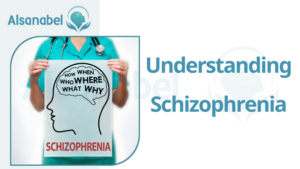The Impact of Schizophrenia on Individuals and Society 2023
- Category ADHD
Schizophrenia is a severe mental disorder that affects how a person thinks, feels, and behaves. It is typically characterized by a combination of hallucinations, delusions, disorganized thinking, and altered behavior. This condition has been recognized and studied for centuries, with significant advancements in understanding its causes and treatment options.
In the early 20th century, researchers like Emil Kraepelin and Eugen Bleuler made significant contributions to the understanding of schizophrenia. They distinguished it from other mental illnesses and identified its characteristic symptoms. This led to the development of diagnostic criteria and the classification of it as a distinct disorder.
Understanding Schizophrenia
The term “schizophrenia” was first coined by the Swiss psychiatrist Eugen Bleuler in 1908, although the symptoms and manifestations of the disorder have been observed throughout history. Early historical accounts referred to individuals exhibiting symptoms of psychosis as being possessed by demons or spirits. It was not until the 19th century that mental health professionals began to recognize mental disorders as medical conditions.

Causes and risk factors
The exact cause of schizophrenia is yet to be fully understood. It appears to be a complex interplay of genetic, environmental, and neurological factors. Some potential risk factors for developing it include a family history of the disorder, exposure to certain infections during prenatal development, and stressful life events. Neurotransmitter imbalances, such as an excess of dopamine in the brain, have also been linked to it.
While anyone can develop schizophrenia, certain factors may increase the likelihood. Men typically experience the onset of symptoms earlier than women, and individuals with a family history of it are at a higher risk. Substance abuse, particularly marijuana and hallucinogenic drugs, can also increase the risk of developing it or exacerbate symptoms in individuals who already have the disorder.
It is important to note that this illenes is a chronic condition that requires lifelong management. Treatment typically involves a combination of medication, therapy, and support services. With the right treatment and support, many individuals with schizophrenia can lead meaningful and fulfilling lives.
Biological Factors
Genetics and hereditary aspects
It is widely acknowledged that genetics play a significant role in the development of schizophrenia. Research has shown that individuals with a family history of the disorder have a higher risk of developing it. themselves. According to studies, if one parent has this disorder, the child has a 10% chance of developing the disorder, whereas if both parents have it, the risk increases to 40%. These findings strongly suggest a hereditary component to the condition.
Neurochemical imbalances and brain abnormalities
Another important biological factor associated with schizophrenia is neurochemical imbalances and brain abnormalities. Studies have revealed that people with this disorder often have disrupted levels of neurotransmitters, particularly dopamine. Excess dopamine in the brain has been linked to the hallucinations and delusions experienced by individuals with this disorder.
Additionally, abnormalities in brain structure and function have been observed in those with schizophrenia. Magnetic resonance imaging (MRI) scans have shown differences in brain volume and activity in individuals with the disorder compared to those without.
Environmental factors, such as prenatal infections or certain life events, can also contribute to the manifestation of schizophrenia in individuals with a genetic predisposition. Researchers are actively studying the interplay between genetics, neurobiology, and environmental factors to gain a better understanding of this complex disorder.
Overall, biological factors play a significant role in the development of this disorder. The hereditary nature of the disorder suggests a strong genetic component, while neurochemical imbalances and brain abnormalities further contribute to the symptoms experienced by individuals with this disorder. Understanding these biological factors is crucial for advancing research and developing effective treatments for this challenging mental illness.
Psychological Factors
Stress and trauma as triggers
Stress and trauma have been identified as potential triggers for the onset or exacerbation of this disorder. Research suggests that individuals who experience significant stress or trauma, such as physical or emotional abuse, are more likely to develop the disorder. Stressful life events, such as losing a loved one or experiencing a major life change, can also contribute to the development of this disorder in vulnerable individuals.
Cognitive and emotional deficits
Individuals with schizophrenia often experience cognitive and emotional deficits that impact their daily functioning. Cognitive deficits can include problems with attention, memory, and executive functioning.
Emotional deficits may involve difficulties in expressing or recognizing emotions, as well as experiencing inappropriate or flattened affect. These deficits can significantly impair a person’s ability to maintain relationships, work, or engage in meaningful activities.
It is important to note that psychological factors alone do not cause this disorder. Rather, they interact with biological and environmental factors to contribute to the development and progression of the disorder. The exact nature of the relationship between psychological factors and schizophrenia is complex and still not fully understood. Ongoing research aims to better understand the mechanisms underlying these factors and their impact on schizophrenia.
Treatment Approaches

Antipsychotic medications and their effectiveness
Antipsychotic medications are the primary treatment for schizophrenia. These drugs work by targeting the neurotransmitter imbalances in the brain that are believed to contribute to the symptoms of the disorder. There are two main types of antipsychotics: typical and atypical.
Typical antipsychotics, such as haloperidol and chlorpromazine, have been used for many years and are effective in reducing positive symptoms like hallucinations and delusions. However, they may have more side effects, such as movement disorders.
Atypical antipsychotics, such as risperidone and olanzapine, are newer medications that are often preferred due to their reduced side effects. These medications not only target positive symptoms but also help improve negative symptoms and cognitive deficits. However, they can still cause side effects like weight gain and metabolic changes.
It is important to note that medication response can vary between individuals, and finding the right medication and dosage may require trial and error. Regular monitoring by a healthcare professional is crucial to ensure the effectiveness of the medication and minimize side effects.
Psychosocial interventions and therapy options
In addition to medication, psychosocial interventions play a crucial role in the treatment of schizophrenia. These interventions aim to address the social, occupational, and psychological challenges faced by individuals with the disorder.
Some common psychosocial interventions include:
- Cognitive Behavioral Therapy (CBT): This type of therapy helps individuals identify and challenge negative thought patterns and develop coping strategies to manage symptoms.
- Social Skills Training: This intervention focuses on improving communication and social interaction skills, which can help individuals enhance their relationships and overall quality of life.
- Family Therapy: Family therapy involves the participation of family members and aims to improve family dynamics, communication, and support. This can help create a more supportive environment for the individual with schizophrenia.
- Vocational Rehabilitation: This intervention focuses on helping individuals with schizophrenia develop employment skills and find meaningful work opportunities. It can also provide support in maintaining employment.
It is important to customize treatment plans based on individual needs and preferences. A combination of medication and psychosocial interventions is generally considered the most effective approach in managing schizophrenia symptoms and improving overall functioning. Regular follow-up and ongoing support from healthcare professionals and mental health providers are crucial for long-term success in managing the disorder.
Social Consequences
Stigma and discrimination
Schizophrenia is a complex mental disorder that often carries a significant social stigma. People with this disorder may face discrimination and misunderstanding from others due to misconceptions and stereotypes about the condition. The stigma surrounding this disorder can lead to isolation, social exclusion, and a reluctance to seek help or share their experiences. It is essential to challenge these prejudices and educate society about the realities of living with schizophrenia.
Impacts on employment and education opportunities
Schizophrenia can have a profound impact on employment and education opportunities for individuals affected by the condition. The symptoms and challenges associated with this disorder, such as cognitive deficits and social difficulties, may make it challenging to succeed in academic and professional settings.
Discrimination and misconceptions about this disorder can also lead to employers and educational institutions being hesitant to provide accommodations and support. This can result in limited job opportunities and hinder educational advancement for individuals with schizophrenia.
However, with appropriate treatment and support, many individuals with schizophrenia can lead fulfilling lives and contribute to society. It is crucial to provide education and training on accommodations and support for employers and educational institutions. Promoting inclusive and supportive environments can help individuals with this disorder overcome barriers and pursue their goals.
Family and Caregivers
Family members of individuals with this disorder often face numerous challenges and significant emotional, physical, and financial burdens. They may struggle to understand and cope with the symptoms and behaviors associated with the condition. Witnessing a loved one experience hallucinations, delusions, or disorganized thinking can be distressing and overwhelming.
Moreover, family members often shoulder the responsibility of providing care and support for their loved ones with this disorder. This can include managing medications, ensuring regular medical appointments and therapy sessions, and helping with daily activities. The caregiving role can impact family members’ own mental health, relationships, and overall quality of life.
Financial strain is another issue that families may encounter. The cost of medications, therapy, and other treatments for schizophrenia can be expensive, placing additional stress on the family’s finances. Additionally, family members may need to make adjustments to their work schedules or take on extra responsibilities, leading to potential income loss or employment difficulties.
Support networks and resources
Fortunately, there are support networks and resources available to assist family members of individuals with this disorder. Mental health organizations and support groups provide platforms for families to connect, share experiences, and access information and guidance. Peer support from others who have gone through similar experiences can be invaluable in navigating the challenges of supporting a loved one with schizophrenia.
Professional counseling and therapy services can also help family members cope with the emotional toll of schizophrenia. Therapists can provide education, support, and strategies for managing stress, communication difficulties, and caregiving responsibilities. Family therapy sessions may be beneficial in improving understanding, fostering healthy communication, and strengthening relationships within the family unit.
Financial assistance programs and resources are available to help alleviate the financial burdens associated with this disorder. These programs may include government assistance, insurance coverage, and discounts for medications. Social workers and case managers can provide guidance on accessing these benefits and connecting families with relevant services.
Promising research and future directions
Researchers and scientists are continually working to advance the understanding and treatment of schizophrenia. Promising areas of research include studying the genetic and neurobiological factors that contribute to the development of the condition. This knowledge can help identify potential targets for medication and intervention strategies.

In recent years, there has also been a growing interest in exploring the role of psychosocial interventions in managing this disorder. Therapies such as cognitive-behavioral therapy and social skills training have shown promise in improving various aspects of the condition, including symptom management and functional outcomes.
Future directions in schizophrenia research aim to develop more effective and personalized treatment approaches. This could involve the use of technology, such as virtual reality, to provide immersive and tailored interventions. Additionally, advancements in pharmacogenetics may help identify medication regimens that are better suited for individual patients based on their genetic makeup.
Importance of early intervention and support
Early intervention plays a crucial role in improving outcomes for individuals with schizophrenia. Prompt diagnosis and treatment can help minimize the impact of the condition on an individual’s life and prevent further deterioration. Early intervention programs often involve a combination of medication management, therapy, and psychosocial support.
Educating the general public and healthcare professionals about the signs and symptoms of schizophrenia is essential for early detection. By recognizing early warning signs and seeking help promptly, individuals with schizophrenia can receive the support they need to manage their condition effectively.
Support systems for individuals living with schizophrenia, their families, and caregivers are equally important. Providing accessible mental health services, community support programs, and resources can help individuals with schizophrenia lead fulfilling lives and reduce the burden on themselves and their loved ones.
In conclusion, while schizophrenia poses significant challenges, ongoing research and early intervention efforts offer hope for improved outcomes. By investing in research, expanding access to quality healthcare, and prioritizing support services, we can make strides in reducing the economic burden and enhancing the well-being of individuals with schizophrenia and their families.









